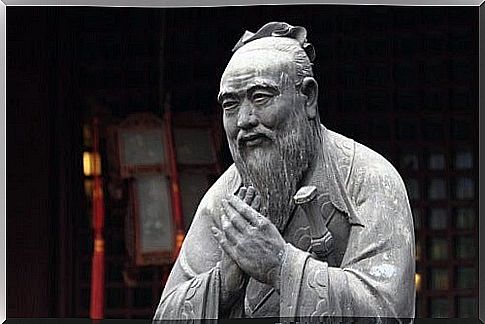The Metaphor Of The Three Wise Monkeys, A Guideline For A Happy Life

The majority of people have the three wise monkeys ever ever seen. Usually it is the image of three monkeys with one covering his mouth, the other his ears and the last his eyes. This is a wooden sculpture from the seventeenth century. It refers to the ways in which we can live a good life in many ways.
The sculpture was made at the Tõshõ-gu Shrine in Japan. Each of the three wise monkeys also has a name: Mizaru, Kikazaru and Iwazaru. These names mean not to see, not to hear and not to speak respectively. But what does that have to do with living a happy life?
Everything seems to indicate that this sculpture embodies a proverbial principle of Confucius. This famous maxim says, “See no evil, hear no evil, and speak no evil.”
However, the fundamental principle does not mean that you should distance yourself from everything in the world. It does mean that you refuse to come into contact with bad things. So this is part of the art of living a happy life.
Confucius and the Three Wise Monkeys
This principle of Confucius tells us to avoid evil. Does this make sense? The first thing that comes to mind here is that we can refuse to see, hear, or speak evil. However, that doesn’t mean it will disappear from the world. We can ask ourselves another question. What do we achieve in life if we know or speak of evil?
Deep within ourselves is a paranoid trait that finds satisfaction in bad things. Another possibility is that we tell ourselves that we are automatically protected from any threat if we are aware of depravity.
For example, if you know that many crimes happen in a certain alley, you will be able to avoid this place and reduce the risk of robbery.
That makes sense. However, if you take a closer look at this reasoning, it doesn’t really make sense. Why? The evil in the world is the exception and not the rule. There are many more honest and good people.
In addition, it has been proven that being nervous or tense is one of the things thieves check before attacking someone. Victims and perpetrators both have certain things in common.

Interest in evil and living a happy life
We can live without knowing the latest quantum physics breakthrough. Then why shouldn’t we be able to live without being aware of the evil in the world?
We should also mention here that there are reasons to think that witnessing atrocious crimes, whether in person or on television, increases our propensity to commit a crime or increases our potential to become a victim.
This has to do with mirror neurons. The brain is not always able to distinguish between reality and fantasy. For example, that’s why we’re scared during a horror movie. We know perfectly well that it is fiction. Yet it still causes certain emotions in us.
So seeing, hearing or speaking evil can have a toxic effect on our minds. It is possible that evil is feeding our fears or the monster that hides deep within us. So perhaps Confucius was right after all with the metaphor of the three wise monkeys.

Mental hygiene
The sculpture of the three wise monkeys is a guideline to lead a happy life. It is a fundamental principle of mental hygiene. Seeing, listening to or talking about bad things can lead to a state of fear.
Suddenly we forget that statistically and mathematically there are more good people than bad people in the world. We then believe the opposite. We feel that we live in a reality where something terrible can happen to us at any moment.
Many people think “What if I am the victim of real evil?” Here you can perfectly apply the principle of Confucius. We need to work on this and push these thoughts away.

Bad and inappropriate things are topics that sell. It’s all part of some form of pain pornography. It scares you and fascinates you at the same time.
Horror and fascination are neurotic. Part of the art of living a happy life is changing our perspective on the world. We also need to change the way we act based on this perspective. So it is fully justified to refuse to witness or participate in evil deeds.









